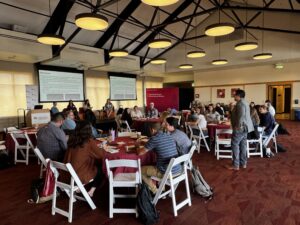Korbel ranked 12th best place in the world to earn a master’s degree in international relations.
Korbel ranked 20th in the world for the best undergraduate degree in international studies.
Korbel ranked 12th best place in the world to earn a master’s degree in international relations.
Korbel ranked 20th in the world for the best undergraduate degree in international studies.

The Korbel School’s Scrivner Institute of Public Policy and DU’s Center for Immigration Policy Research (CIPR) recently joined forces to present a Scrivner Policy Roundtable focusing on the DU Courtwatch Project. The Scrivner Policy Roundtable offers a chance for the DU and local policy communities to dive deep into pressing local issues. Designed to spark dialogue and build bridges, the roundtables are more than just discussions—they’re a catalyst for connection and action. The Scrivner Institute organizes the series and convenes the policy community in Denver and on campus, while partner organizations present their work or research and facilitate robust group discussions on the topic at hand.
The Scrivner Policy Roundtable is a fruitful example of leveraging synergies between DU entities and the Denver community to spur partnerships and opportunities to collaborate. The discussions that the roundtable facilitates among students, community organizations, faculty, and staff provide a more intimate, organic, and engaging way for students to network with the community, opening up potential projects, internship, or employment opportunities for students interested in local policy.
The latest Roundtable, “(In)Justice in the Immigration Court System,” was led by CIPR faculty, student research assistants, and community partners, including:
Panelists presented on the historical influences and current structure of the U.S. immigration court system, while also sharing personal observations of the Denver immigration court system. Their research focuses on two expedited mechanisms: the Dedicated Docket and the Family Expedited Removal Management Program (FERM). Table and group discussions following the presentation emphasized how academic research can advance social and policy change by bolstering transparency and promoting due process in a widely misunderstood and overburdened immigration system. Dr. Galemba noted that much of Denver’s immigration court proceedings are open to the public, saying “it takes an army to look at the immigration system.” The presenters extrapolated important lessons we can apply to the current moment in American immigration, which is seeing an unprecedented erosion of due process and a delegitimization of the internationally recognized right to claim asylum.
This collaborative Roundtable event, brought to life by the combined efforts of the Scrivner Institute and the CIPR, is the most recent example of the ways Korbel faculty and staff are connecting students with the broader Denver community. “It was informative, fascinating, and inspiring to hear the words of faculty, students, and community partners in conversation with each other about their intersecting sets of knowledge and shared commitment to using that knowledge for the collective good," said Dr. Naazneen Barma, Director of the Scrivner Institute of Public Policy and Associate Dean for Faculty Affairs at the Korbel School of International Studies. Korbel student, sophomore Klaire Cherryhomes, shared “I really valued the research, the empirical aspect of the presentation. Research is an essential way to deliver rights. Providing transparency to these incredibly closed-off systems is powerful."
The Scrivner Policy Roundtable exemplifies the Scrivner Institute’s commitment to its mission to equip students to tackle today’s most crucial policy issues with a local to global perspective and an emphasis on practical solutions. The Institute and Korbel School are dedicated to providing students opportunities to participate in essential, timely policy discussions by collaborating across DU and working alongside essential community partners.
Watch the recording of the event here, and to learn more about the Scrivner Policy Roundtables, visit the Scrivner Institute’s website.
This article was written with support from Scrivner Institute student Program Assistant Katia Diamond-Sagias.
Copyright ©2025 | All Rights Reserved | Equal Opportunity Affirmative Action Institution